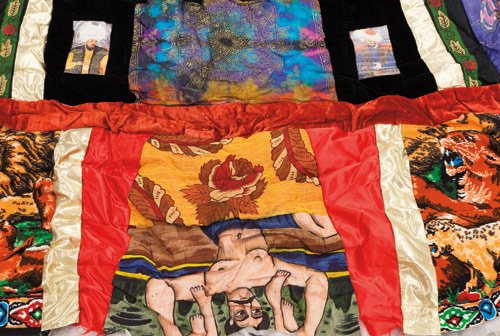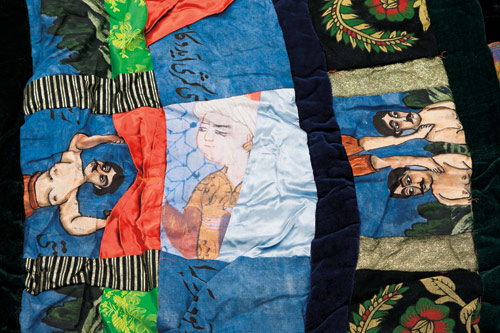1995
Gülsün Karamustafa

Shortly after graduating in 1969, Gülsün Karamustafa was convicted for hiding a political fugitive at her home in Istanbul and consequently had her passport annulled until 1987. This was a period of massive migration from rural areas to the city, leading to the creation of large, run-down suburban settlements. The clash between the newcomers’ Anatolian culture and urban life produced hybrid cultural forms known as arabesk, after the musical genre that popularised Asian-influenced commercial songs amongst the lower classes. Having come into close contact with this kitsch culture while working as an art director in film, in the mid-to-late 1980s Karamustafa began to appropriate wall carpets found in migrants’ homes in a series of textile collages that earned her the label of ‘arabesque painter’. This subtly belittling moniker reveals the provocation inherent in the artist’s use of popular imagery, which was bluntly dismissed by the middle-class intelligentsia to which she belongs.
Although informed by her use of textile collage in this earlier series of works, Resimli Tarih [Illustrated History] responds to the new global context that began to emerge after the fall of the Berlin Wall. This hand-sewn, seven-metre-long collage takes the form of a kaftan: a long, belted tunic that came to symbolise power and wealth during the Ottoman Empire. While the vividly coloured illustrations of lush vegetation, peacocks, hardy servants and magnificent palaces are reminiscent of imperial iconography, the fabrics are hardly opulent and the cluttered patchwork is at odds with the elegant design of Ottoman kaftans.

In the wake of the sudden disintegration of the Soviet Union, Karamustafa gathers the remains of another fallen empire in an informal visual archaeology where miniature portraits of sultans coexist with fragments from kitsch wall carpets and synthetic velvet and silk fabrics cheaply available on the streets of Istanbul. On a monumental scale, Resimli Tarih pays tribute to popular culture’s cannibalisation of once hegemonic forms and symbols while also mourning the end of an era. – HV